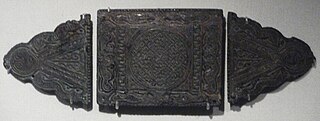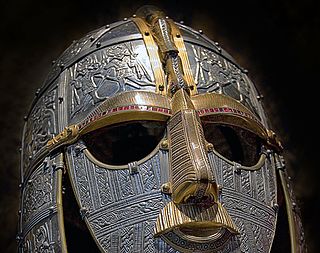
The National Coal Mining Museum for England is based at the site of Caphouse Colliery in Overton, Wakefield, West Yorkshire, England. It opened in 1988 as the Yorkshire Mining Museum and was granted national status in 1995.

Rupert Leo Scott Bruce-Mitford was a British archaeologist and scholar. He spent the majority of his career at the British Museum, primarily as the Keeper of the Department of British and Medieval Antiquities, and was particularly known for his work on the Sutton Hoo ship-burial. Considered the "spiritus rector" of such research, he oversaw the production of the monumental three-volume work The Sutton Hoo Ship-Burial, termed by the president of the Society of Antiquaries as "one of the great books of the century".
Barbara Yorke FRHistS FSA is a historian of Anglo-Saxon England, specialising in many subtopics, including 19th-century Anglo-Saxonism. She is currently emeritus professor of early Medieval history at the University of Winchester, and is a fellow of the Royal Historical Society. She is an honorary professor of the Institute of Archaeology at University College London.

Mucking is an archaeological site near the village of Mucking in southern Essex. The site contains remains dating from the Neolithic to the Middle Ages—a period of some 3,000 years—and the Bronze Age and Anglo-Saxon features are particularly notable.

The settlement of Great Britain by diverse Germanic peoples, who eventually developed a common cultural identity as Anglo-Saxons, changed the language and culture of most of what became England from Romano-British to Germanic. This process principally occurred from the mid-fifth to early seventh centuries, following the end of Roman rule in Britain around the year 410. The settlement was followed by the establishment of the Heptarchy, Anglo-Saxon kingdoms in the south and east of Britain, later followed by the rest of modern England, and the south-east of modern Scotland. The exact nature of this change is a topic of on-going research. Questions remain about the scale, timing and nature of the settlements, and also about what happened to the previous residents of what is now England.

St Oswald's Priory was founded by Æthelflæd, daughter of Alfred the Great, and her husband Æthelred, ealdorman of Mercia, in the late 880s or the 890s. It appears to have been an exact copy of the Old Minster, Winchester It is a Grade I listed building.
Helena Francisca Hamerow, is an American archaeologist, best known for her work on the archeology of early medieval communities in Northwestern Europe. She is Professor of Early Medieval archaeology and former Head of the School of Archaeology, University of Oxford.
Edward Thurlow Leeds was an English archaeologist and museum curator. He was Keeper of the Ashmolean Museum from 1928 to 1945.
Dominic Powlesland, is a British landscape archaeologist based in North Yorkshire. He has contributed to the methodologies of field archaeology and landscape survey, particularly geophysics and the use of computers when recording and processing archaeological data. He is the director of the Landscape Research Centre and visiting professor at the universities of York, Leeds, Huddersfield and Vienna.

Sitlington, historically Shitlington, was a township in the ancient ecclesiastical parish of Thornhill in the wapentake of Agbrigg and Morley in the West Riding of Yorkshire comprising the villages and hamlets of Middlestown, Netherton, Overton and Midgley. The h was dropped from Shitlington and Sitlington was adopted in 1929 with the approval of the county council. The population of the civil parish at the 2011 census was 5,963.
Cecily Margaret Guido,, also known as Peggy Piggott, was an English archaeologist, prehistorian, and finds specialist. Her career in British archaeology spanned sixty years, and she is recognised for her field methods, her field-leading research into prehistoric settlements, burial traditions, and artefact studies, as well as her high-quality and rapid publication, contributing more than 50 articles and books to her field between the 1930s and 1990s.

Margaret Ursula Jones was an English archaeologist, best known for directing major excavations at Mucking, Essex.
Julian Daryl Richards is a British archaeologist and academic. He works at the University of York where he is Professor of Archaeology, director of its Centre for Digital Heritage, and director of the Archaeology Data Service (ADS). He is also co-director of the academic journal Internet Archaeology, and contributed to the founding of The White Rose College of the Arts & Humanities. His work focuses on the archaeological applications of information technology. He has participated in excavations at Cottam, Cowlam, Burdale, Wharram Percy, and Heath Wood barrow cemetery.

Sonia Chadwick Hawkes was a British archaeologist specialising in early Anglo-Saxon archaeology. She led excavations on Anglo-Saxon cemeteries at Finglesham in Kent and Worthy Park in Hampshire. She was described by fellow medieval archaeologist Paul Ashbee as a "discerning systematiser of the great array of Anglo-Saxon grave furnishings".

Asthall barrow is a high-status Anglo-Saxon burial mound from the seventh century AD. It is located in Asthall, Oxfordshire, and was excavated in 1923 and 1924.

Leeds Museums and Galleries is a museum service run by the Leeds City Council in West Yorkshire. It manages eight sites and is the largest museum service in England and Wales run by a local authority.
Dawn Marie Hadley is a British historian and archaeologist, who is best known for her research on the Anglo-Saxon and Viking Age periods, the study of childhood, and gender in medieval England. She is a member of the Centre for Medieval Studies and the department of archaeology at the University of York.

Hilda Elizabeth Jean Le Patourel was a British archaeologist. She specialised in the ceramics and pottery of Yorkshire. She later expanded her field of research to include moated sites and the archaeological remains of dog collars.
Della Hooke, is a British historical geographer and academic, who specialises in landscape history and Anglo Saxon England.










